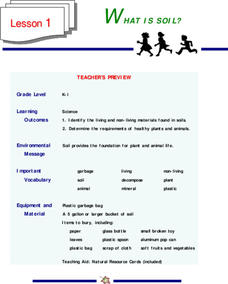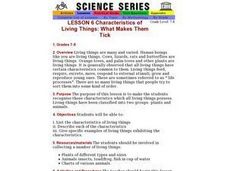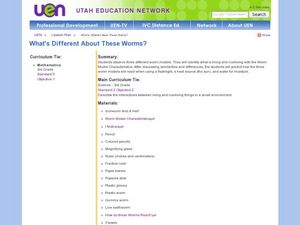Curated OER
It's Alive! Or is it...?
Students apply their knowledge of the characteristics of living things to unknown creatures to determine whether they can be considered "alive." They watch a Star Trek episode, then describe the characteristics of life.
Curated OER
Draw an Alien in Natural Habitat
Students apply prior knowledge of living things, structures of living things and how living things sense and respond to their environment. In this habitat lesson, students review the basic needs of organisms to survive. Students create...
Curated OER
The Martian and the Car
In this living things activity, students determine 5 things about a car that makes it seem like its a living thing and 5 things that prove it is not a living thing. This activity has 10 short answer questions.
Curated OER
Plants are Growing and Changing
Learners explore living things. In this agriculture activity, students read the book A Tree is a Plant and participate in an experiment to explore the patterns of change in living things. Learners continue to observe the plant throughout...
Curated OER
How Are We Alike and Different?
Students review an online database and look for similarities and differences among the plants, animals, and non-living things that were listed. They compose a narrative based on their conclusions.
Curated OER
Field Trip to your Square
Students visit an outdoors area and mark out a square on the ground that they examine. They look for and record the plants, animals, and non-living things they find in the square and post their findings on the Internet for other classes...
Curated OER
What is Soil?
Students study living and non-living materials that are found in soil. They study the things required by plants and animals to remain healthy. They design a collage of sand, stones, leaves and other natural items.
Curated OER
Investigation 3 - Terrariums / Aquariums
Third graders create aquariums or terrariums to explain how creatures depend on living and nonliving things.
Curated OER
Living or Nonliving
Third graders brainstorm a list of the characteristics of living and nonliving organisms. Individually, they find four nonliving and living items and the characteristics that make them fit into one of the categories. To end the lesson,...
Curated OER
Secrets to Healthy Soil
Fourth graders explore needed mineral nutrients for healthy soil. In this soil lesson, 4th graders investigate how living and nonliving elements combine to contribute to fertile soil development.
Captain Planet Foundation
Sorting Out Soils
Sift through soil and learn about why it's important for organic processes. After discussing what makes up soil, such as the living organisms and what types of soil have more nutrients, kids sample layers of mulch and deeper soil to...
Denver Art Museum
The Poetry in Non-Events
The photograph, Nellie and her Italian Soda is viewed and discussed by the class. They are instructed to use the photograph as inspiration to write a poem about non-events, or things that are beautiful in every day life. Pupils use a...
Curated OER
Non-Defining Relative Pronouns Exercise
Writing flows better with complex and compound sentences. Teach your learners how to combine sentences using relative clauses. This activity has 10 questions, but there are no examples provided. Consider providing at least a few examples...
Curated OER
Characteristics of Living Things: What Makes Them Tick
Students list the characteristics of living things and give specific examples of living things exhibiting these characteristics. They bring in examples of living things.
Curated OER
Living and Non-Living Things
In this worksheet on living and non-living things, students categorize items, cutting and pasting their pictures under the correct heading.
Curated OER
Living and Non-Living
Students discover the basic needs of life. In this science lesson plan, students explore how all living things need air, water, food and shelter
Curated OER
Wonderful Worms
Students identify living and non-living things and explain the importance of earthworms to the soil. They name some basic facts about earthworms, recognize basic worm vocabulary words and demonstrate vermicomposting techniques.
Curated OER
Endangered Species
Students watch video clips of endangered animals. They imagine a small garden in front of a house and describe the living and non-living things that could interact to make up a garden eco-system.
Pennsylvania Department of Education
Animal Classes and Their Ecosystems
Students explore animal characteristics by participating in an environment identification activity. In this animal habitat lesson, students discuss a range of different wild life and the ecosystems that they are a part of. Students view...
Curated OER
Investigate Science Using Crayfish
Young scientists discover the importance of scientific investigation by observing live crayfish. They carefully observe the patterns of crayfish in different environments. Then they discuss their conclusions and define what all living...
Alliance Theater
The Jungle Book Post-Show STEAM Lesson
An ecosystem is really just the flow of energy through many different living organisms. A study of Rudyard Kipling's The Jungle Book leads to an environmental science activity in which learners study how various factors can affect...
Curated OER
Life Systems- Zoo Central
Students investigate the various aspects associated with living things while also concentrating on their basic needs. They explore the aspects of movement and growth in plants and animals. This is done through research and other...
Curated OER
Three Worm Lesson
Third graders observe properties of three worms. In this living and non-living lesson, 3rd graders study characteristics of living and non-living worms. Students experiment to find how light, heat and moisture effects each of the worms....
Curated OER
Interactions Everywhere!
Young scholars examine interactions within the environment and environmental engineering careers. They discuss and view photos of natural and manmade environments, explore various websites, create a web to identify interactions between...

























